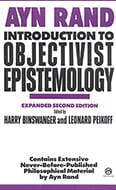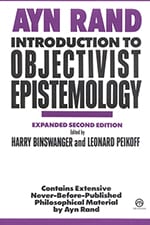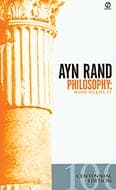“Consciousness and Identity,” which is chapter 8 of Introduction to Objectivist Epistemology, was first published in the February 1967 issue of The Objectivist, then in a booklet containing the entire work (1967), then in a mass market paperback (1979) and most recently in an expanded second edition (1990)
The organization of concepts into propositions, and the wider principles of language — as well as the further problems of epistemology — are outside the scope of this work, which is concerned only with the nature of concepts. But a few aspects of these issues must be indicated.
Since concepts, in the field of cognition, perform a function similar to that of numbers in the field of mathematics, the function of a proposition is similar to that of an equation: it applies conceptual abstractions to a specific problem.
A proposition, however, can perform this function only if the concepts of which it is composed have precisely defined meanings. If, in the field of mathematics, numbers had no fixed, firm values, if they were mere approximations determined by the mood of their users — so that “5,” for instance, could mean five in some calculations, but six-and-a-half or four-and-three-quarters in others, according to the users’ “convenience” — there would be no such thing as the science of mathematics.
Yet this is the manner in which most people use concepts, and are taught to do so.
Above the first-level abstractions of perceptual concretes, most people hold concepts as loose approximations, without firm definitions, clear meanings or specific referents; and the greater a concept’s distance from the perceptual level, the vaguer its content. Starting from the mental habit of learning words without grasping their meanings, people find it impossible to grasp higher abstractions, and their conceptual development consists of condensing fog into fog into thicker fog — until the hierarchical structure of concepts breaks down in their minds, losing all ties to reality; and, as they lose the capacity to understand, their education becomes a process of memorizing and imitating. This process is encouraged and, at times, demanded by many modern teachers who purvey snatches of random, out-of-context information in undefined, unintelligible, contradictory terms.
The result is a mentality that treats the first-level abstractions, the concepts of physical existents, as if they were percepts, and is unable to rise much further, unable to integrate new knowledge or to identify its own experience — a mentality that has not discovered the process of conceptualization in conscious terms, has not learned to adopt it as an active, continuous, self-initiated policy, and is left arrested on a concrete-bound level, dealing only with the given, with the concerns of the immediate moment, day or year, anxiously sensing an abyss of the unknowable on all sides.
To such mentalities, higher concepts are indeterminate splinters flickering in the abyss, which they seize and use at random, with a nameless sense of guilt, with the chronic terror of a dreadful avenger that appears in the form of the question: “What do you mean?”
Words, as such people use them, denote unidentified feelings, unadmitted motives, subconscious urges, chance associations, memorized sounds, ritualistic formulas, second-hand cues — all of it hung, like barnacles, on some swimming suggestion of some existential referent. Consequently (since one cannot form concepts of consciousness without reference to their existential content), the field of introspection, to such people, is an untouched jungle in which no conceptual paths have yet been cut. They are unable to distinguish thought from emotion, cognition from evaluation, observation from imagination, unable to discriminate between existence and consciousness, between object and subject, unable to identify the meaning of any inner state — and they spend their lives as cowed prisoners inside their own skulls, afraid to look out at reality, paralyzed by the mystery of their own consciousness.
These are the mentalities that modern philosophy now asks us to accept as the criterion of the meaning of concepts.
The reductio ad absurdum of a long line of mini-Kantians, such as pragmatists and positivists, Linguistic Analysis holds that words are an arbitrary social product immune from any principles or standards, an irreducible primary not subject to inquiry about its origin or purpose — and that we can “dissolve” all philosophical problems by “clarifying” the use of these arbitrary, causeless, meaningless sounds which hold ultimate power over reality. (The implicit psychological confession is obvious: it is an attempt to formalize and elevate second-handedness into a philosophical vocation.)
Proceeding from the premise that words (concepts) are created by whim, Linguistic Analysis offers us a choice of whims: individual or collective. It declares that there are two kinds of definitions: “stipulative,” which may be anything anyone chooses, and “reportive,” which are ascertained by polls of popular use.
As reporters, linguistic analysts were accurate: Wittgenstein’s theory that a concept refers to a conglomeration of things vaguely tied together by a “family resemblance” is a perfect description of the state of a mind out of focus.
Such is the current condition of philosophy. If, in recent decades, there has been an enormous “brain-drain” from the humanities, with the best minds seeking escape and objective knowledge in the physical sciences (as demonstrated by the dearth of great names or achievements in the humanities), one need look no further for its causes. The escape, however, is illusory. It is not the special sciences that teach man to think; it is philosophy that lays down the epistemological criteria of all special sciences.
To grasp and reclaim the power of philosophy, one must begin by grasping why concepts and definitions cannot and may not be arbitrary. To grasp that fully, one must begin by grasping the reason why man needs such a science as epistemology.
Man is neither infallible nor omniscient; if he were, a discipline such as epistemology — the theory of knowledge — would not be necessary nor possible: his knowledge would be automatic, unquestionable and total. But such is not man’s nature. Man is a being of volitional consciousness: beyond the level of percepts — a level inadequate to the cognitive requirements of his survival — man has to acquire knowledge by his own effort, which he may exercise or not, and by a process of reason, which he may apply correctly or not. Nature gives him no automatic guarantee of his mental efficacy; he is capable of error, of evasion, of psychological distortion. He needs a method of cognition, which he himself has to discover: he must discover how to use his rational faculty, how to validate his conclusions, how to distinguish truth from falsehood, how to set the criteria of what he may accept as knowledge. Two questions are involved in his every conclusion, conviction, decision, choice or claim: What do I know? — and: How do I know it?
It is the task of epistemology to provide the answer to the “How?” — which then enables the special sciences to provide the answers to the “What?”
In the history of philosophy — with some very rare exceptions — epistemological theories have consisted of attempts to escape one or the other of the two fundamental questions which cannot be escaped. Men have been taught either that knowledge is impossible (skepticism) or that it is available without effort (mysticism). These two positions appear to be antagonists, but are, in fact, two variants on the same theme, two sides of the same fraudulent coin: the attempt to escape the responsibility of rational cognition and the absolutism of reality — the attempt to assert the primacy of consciousness over existence.
Although skepticism and mysticism are ultimately interchangeable, and the dominance of one always leads to the resurgence of the other, they differ in the form of their inner contradiction — the contradiction, in both cases, between their philosophical doctrine and their psychological motivation. Philosophically, the mystic is usually an exponent of the intrinsic (revealed) school of epistemology; the skeptic is usually an advocate of epistemological subjectivism. But, psychologically, the mystic is a subjectivist who uses intrinsicism as a means to claim the primacy of his consciousness over that of others. The skeptic is a disillusioned intrinsicist who, having failed to find automatic supernatural guidance, seeks a substitute in the collective subjectivism of others.
The motive of all the attacks on man’s rational faculty — from any quarter, in any of the endless variations, under the verbal dust of all the murky volumes — is a single, hidden premise: the desire to exempt consciousness from the law of identity. The hallmark of a mystic is the savagely stubborn refusal to accept the fact that consciousness, like any other existent, possesses identity, that it is a faculty of a specific nature, functioning through specific means. While the advance of civilization has been eliminating one area of magic after another, the last stand of the believers in the miraculous consists of their frantic attempts to regard identity as the disqualifying element of consciousness.
The implicit, but unadmitted premise of the neo-mystics of modern philosophy, is the notion that only an ineffable consciousness can acquire a valid knowledge of reality, that “true” knowledge has to be causeless, i.e., acquired without any means of cognition.
This is a negation, not only of man’s consciousness, but of any consciousness, of consciousness as such, whether man’s, insect’s or God’s. (If one supposed the existence of God, the negation would still apply: either God perceives through no means whatever, in which case he possesses no identity — or he perceives by some divine means and no others, in which case his perception is not valid.) As Berkeley negated existence by claiming that “to be, is to be perceived,” so Kant negates consciousness by implying that to be perceived, is not to be.
What Kant implied through coils of obfuscating verbiage, his more consistent followers declared explicitly. The following was written by a Kantian: “With him [Kant] all is phenomenal [mere appearance] which is relative, and all is relative which is an object to a conscious subject. The conceptions of the understanding as much depend on the constitution of our thinking faculties, as the perceptions of the senses do on the constitution of our intuitive faculties. Both might be different, were our mental constitution changed; both probably are different to beings differently constituted. The real thus becomes identical with the absolute, with the object as it is in itself, out of all relation to a subject; and, as all consciousness is a relation between subject and object, it follows that to attain a knowledge of the real we must go out of consciousness.” (Henry Mansel, “On the Philosophy of Kant,” reprinted in Henry Mansel, Letters, Lectures and Reviews, ed. H. W. Chandler, London: John Murray, 1873, p. 171.)
From primordial mysticism to this, its climax, the attack on man’s consciousness and particularly on his conceptual faculty has rested on the unchallenged premise that any knowledge acquired by a process of consciousness is necessarily subjective and cannot correspond to the facts of reality, since it is “processed knowledge.”
Make no mistake about the actual meaning of that premise: it is a revolt, not only against being conscious, but against being alive — since in fact, in reality, on earth, every aspect of being alive involves a process of self-sustaining and self-generated action. (This is an example of the fact that the revolt against identity is a revolt against existence. “The desire not to be anything, is the desire not to be.” Atlas Shrugged.)
All knowledge is processed knowledge — whether on the sensory, perceptual or conceptual level. An “unprocessed” knowledge would be a knowledge acquired without means of cognition. Consciousness (as I said in the first sentence of this work) is not a passive state, but an active process. And more: the satisfaction of every need of a living organism requires an act of processing by that organism, be it the need of air, of food or of knowledge.
No one would argue (at least, not yet) that since man’s body has to process the food he eats, no objective rules of proper nutrition can ever be discovered — that “true nutrition” has to consist of absorbing some ineffable substance without the participation of a digestive system, but since man is incapable of “true feeding,” nutrition is a subjective matter open to his whim, and it is merely a social convention that forbids him to eat poisonous mushrooms.
No one would argue that since nature does not tell man automatically what to eat — as it does not tell him automatically how to form concepts — he should abandon the illusion that there is a right or wrong way of eating (or he should revert to the safety of the time when he did not have to “trust” objective evidence, but could rely on dietary laws prescribed by a supernatural power).
No one would argue that man eats bread rather than stones purely as a matter of “convenience.”
It is time to grant to man’s consciousness the same cognitive respect one grants to his body — i.e., the same objectivity.
Objectivity begins with the realization that man (including his every attribute and faculty, including his consciousness) is an entity of a specific nature who must act accordingly; that there is no escape from the law of identity
Objectivity begins with the realization that man (including his every attribute and faculty, including his consciousness) is an entity of a specific nature who must act accordingly; that there is no escape from the law of identity, neither in the universe with which he deals nor in the working of his own consciousness, and if he is to acquire knowledge of the first, he must discover the proper method of using the second; that there is no room for the arbitrary in any activity of man, least of all in his method of cognition — and just as he has learned to be guided by objective criteria in making his physical tools, so he must be guided by objective criteria in forming his tools of cognition: his concepts.
Just as man’s physical existence was liberated when he grasped the principle that “nature, to be commanded, must be obeyed,” so his consciousness will be liberated when he grasps that nature, to be apprehended, must be obeyed — that the rules of cognition must be derived from the nature of existence and the nature, the identity, of his cognitive faculty.







